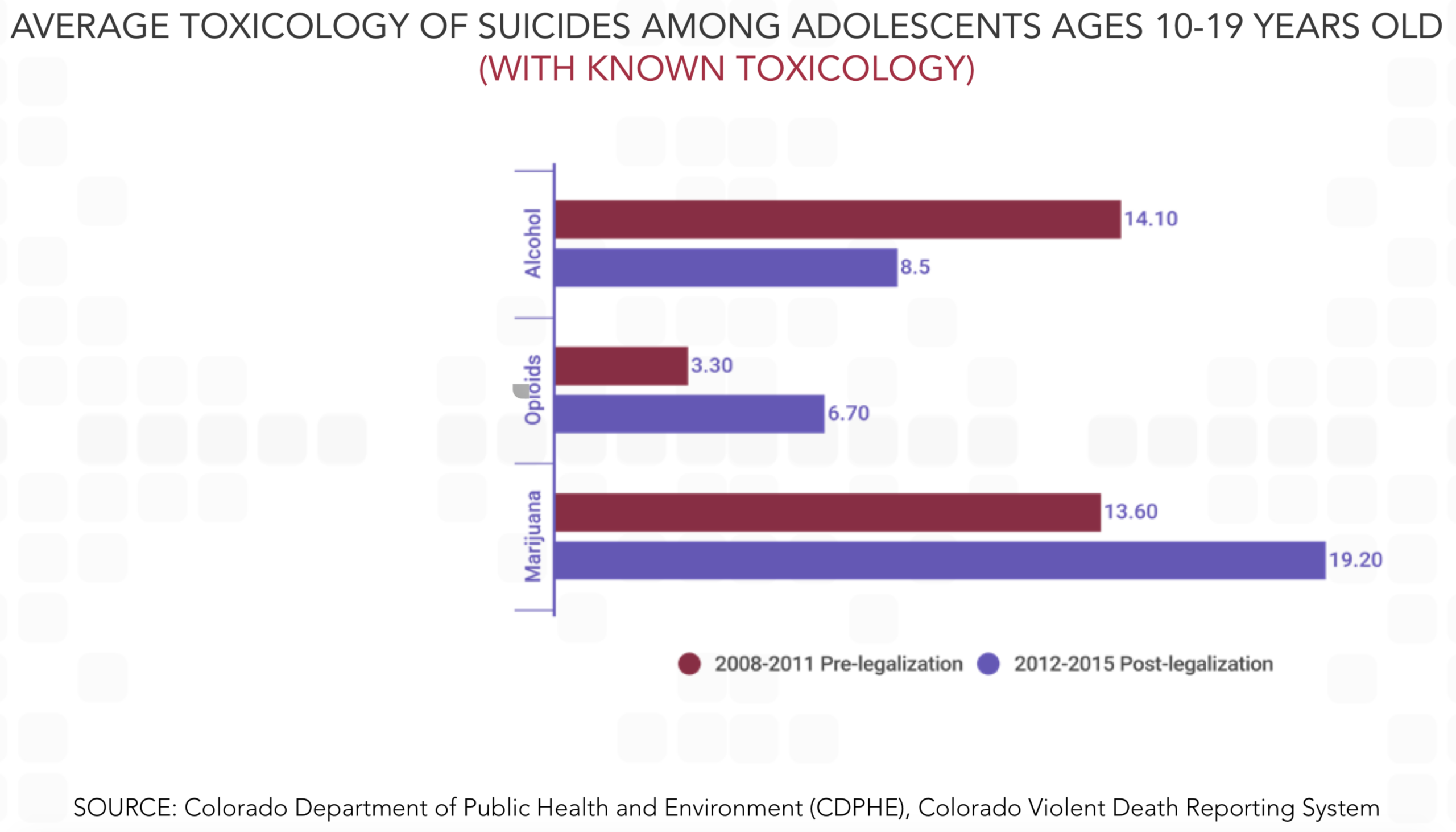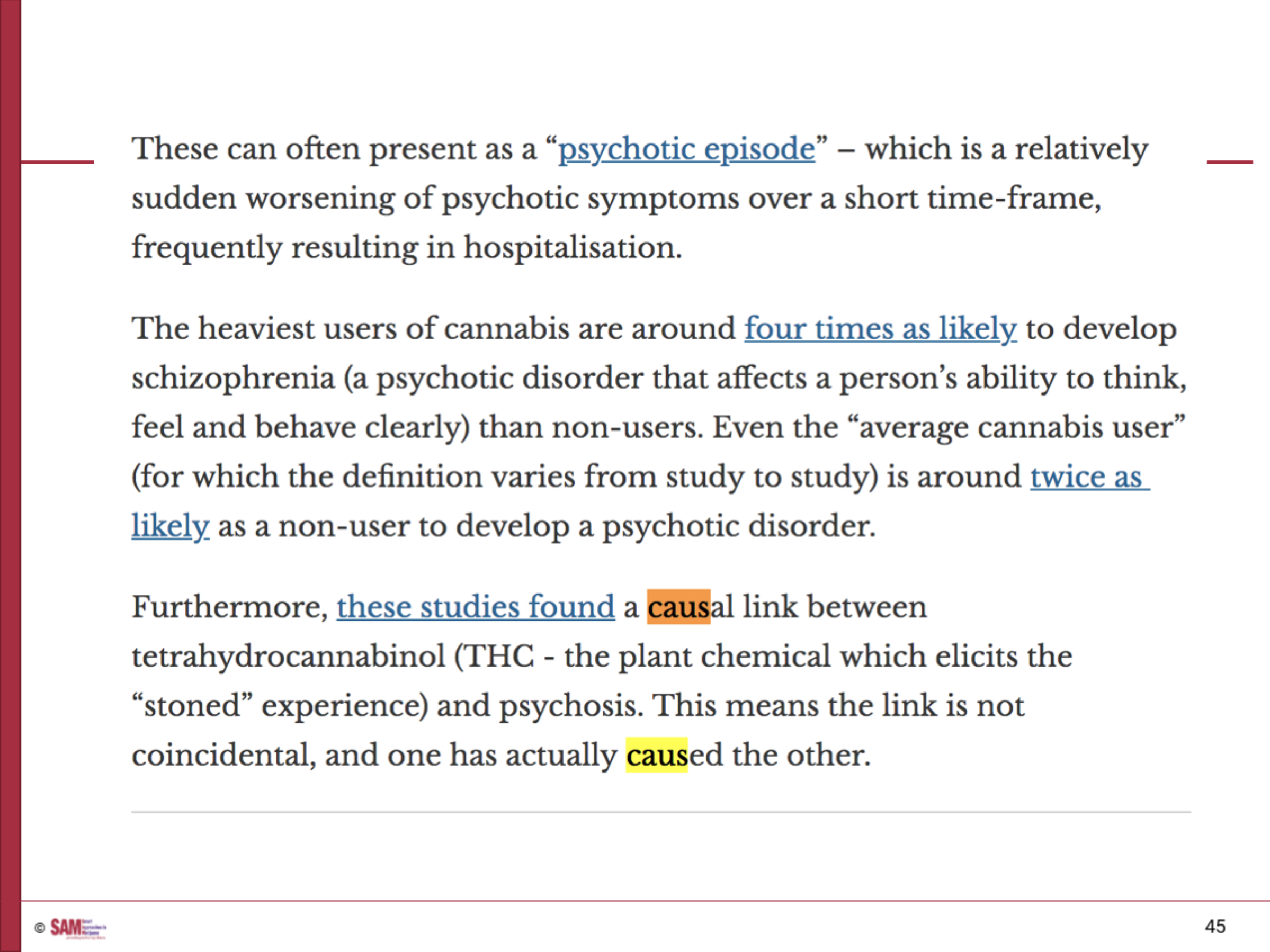“Marijuana can increase the risk of psychosis five-fold…”
Marijuana and Mental Health
- As commercialization increases in legalized states, false advertising of marijuana products as being “natural” and “healthier than alcohol and tobacco” have greatly decreased the perceived risk of harm related to marijuana use. The main psychoactive ingredient in marijuana, THC, has now been observed to cause many different types of mental and physiological health problems— especially in children and youth.
- Marijuana use directly affects the brain — specifically the parts of the brain responsible for memory, learning, attention and reaction time. These effects can last up to 28 days after abstinence from use.
- Science confirms that the adolescent brain — particularly the part of the brain that regulates planning for complex cognitive behavior, personality expression, decision making and social behavior — is not fully developed until the early to mid-20s. Developing brains are especially susceptible to all of the negative effects of marijuana and other drug use.
- A recent study published in the Lancet journal states there is very little “evidence to suggest that cannabinoids improve depressive disorders and symptoms, anxiety disorders, attention-deficit hyperactivity disorder, Tourette syndrome, post-traumatic stress disorder, or psychosis.”
When it comes to marijuana’s effects on the brain, we know from numerous studies conducted with low potency marijuana that the drug has very real, damaging effects on the human brain:
- Direct associations have been made between the frequency of marijuana use and higher THC potency with the development of mental health issues (psychosis, depression, anxiety, suicidality, reshaping of brain matter, and addiction)
- One recent study finds that while marijuana may offer temporary relief to anxiety and stress, it can worsen symptoms of depression overtime.
- Chronic adolescent marijuana use has been correlated with cognitive impairment and a decreased ability to do well in work or school (See here, here, here, and here).
- A number of studies have identified marijuana’s role in the pathway to other substance abuse. For example, a groundbreaking study of over 30,000 Americans showed that participants who reported marijuana use in the previous year were 2.6 times more likely to abuse prescription opioids.
- Colorado toxicology reports show the percentage of adolescent suicide victims testing positive for marijuana has increased. This is not terribly surprising, as daily marijuana use among youth who begin before the age of 17 significantly increases the risk of suicide attempts.
- A 50 year study found that marijuana use is linked to a 7-fold greater odds of subsequent violent crime.
- Marijuana use can increase the risk of developing psychosis 5-fold.
“Marijuana is associated with a 6-fold increased risk of suicide”
So the multitude of data is very clear: marijuana use is disastrous for mental health, but one question remains — is it addictive?
Yes
Research has found that 30% (1 in 3) of past-year marijuana users develop a marijuana use disorder. Published, peer-reviewed work has also found that “since 2001-2002, the prevalence of adult past-year marijuana use and past-year marijuana use disorders increased markedly; the prevalence of adult past-year marijuana use and past-year marijuana use disorders increased markedly…prevalence more than doubled, while the increase was nearly 2-fold in the prevalence of past-year marijuana use disorder.” Brain scans of marijuana users show changes in the structure of the brain’s reward center to be consistent with addiction. Heavy users have also been clearly observed to have withdrawal symptoms
We also know that almost 60 percent of new marijuana users each year are under age 18. Marijuana is the No. 1 reason adolescents are admitted to substance-abuse treatment in the U.S.
None of this means we need to lock up people for using marijuana. But it does mean we should be honest about the drug’s real dangers. And legalization — with all of the American-style promotion that will accompany it — is the last thing people in recovery, parents, communities, and our nation need right now.





